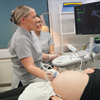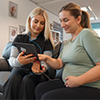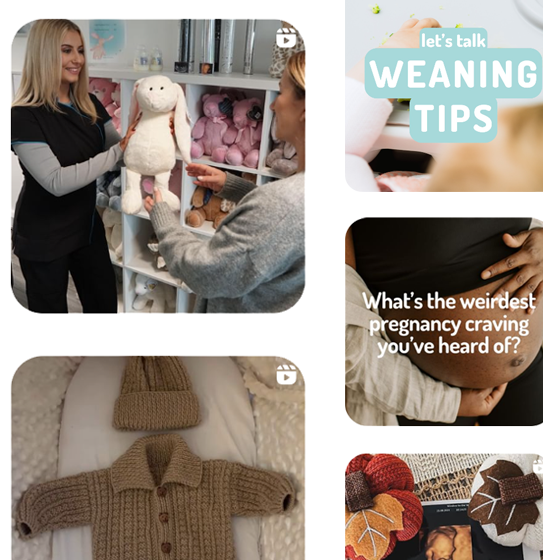One of the most exciting and anticipated moments during pregnancy is when you first feel your baby move. It’s a tangible sign that your little one is growing and developing, and for many mums-to-be, it’s a moment that truly makes the pregnancy feel real. But when exactly can you expect to feel those first flutters? Let’s break it down.
When Will I Feel My Baby Move for the First Time?
For first-time mums, feeling your baby move typically happens between 18 and 25 weeks of pregnancy. It can vary depending on several factors, such as whether it’s your first pregnancy, the position of the placenta, or how active your baby is.
If this isn’t your first pregnancy, you might feel the movements a little earlier—around 16 to 18 weeks. This is because you’ve already experienced the sensations of baby movement before, so your body may recognise them sooner.
What Will It Feel Like?
At first, those early movements might feel more like gentle flutters or bubbles in your stomach. Some describe it as the sensation of butterflies, or a feeling that might resemble gas bubbles, making it a bit hard to distinguish from digestion at first. But as the baby grows and gains strength, the movements will become more pronounced, eventually turning into kicks, jabs, and rolls that are easy to recognise as your baby’s activity.
How Can I Tell if It’s Baby or Something Else?
In the early weeks, it can be tricky to differentiate between your baby’s movements and other sensations like gas or digestion. However, as you enter your second trimester, you may start to notice a regular pattern of movement. If you’ve felt flutters but can’t pinpoint what they are, rest assured that as your pregnancy progresses, they’ll become more distinct and harder to miss.
What Factors Influence When You Feel Baby Move?
- Placenta Placement: If your placenta is positioned in the front of your uterus (called an anterior placenta), it can act as a cushion between your baby and your abdomen, which might make it harder to feel movements early on. This doesn’t affect the baby’s health; it just might delay when you feel those first kicks.
- Body Type: Women with a thinner build may feel movements earlier than those with a larger frame, though it varies for everyone.
- Baby’s Activity Level: Some babies are more active than others. If your baby is already a little mover, you might start to feel those movements earlier.
- Multiple Pregnancies: If you’re carrying twins or multiples, you may feel movements sooner, as there’s less room for the babies to move around.
What If I Don’t Feel My Baby Move Right Away?
First of all, don’t panic! Every pregnancy is unique, and the timing of when you’ll first feel your baby move can vary. If you’re in the second trimester and haven’t felt anything yet, it’s perfectly normal. Remember that your baby is still very small, and those early movements can be subtle.
However, if you’re in your third trimester and haven’t felt any movement, it’s always a good idea to check in with your doctor or midwife. By then, the baby’s movements should be more noticeable, and your healthcare provider can reassure you with an ultrasound or other checks to make sure everything is okay.
What Can I Do to Encourage Movement?
If you’re waiting eagerly for those first kicks, here are a few things you can try to stimulate movement:
- Lie down and relax: Sometimes, simply lying on your side in a quiet place can make it easier to feel movements. When you’re active and busy, it can be harder to notice subtle kicks.
- Have a snack or drink something cold: Babies tend to move after meals or when you drink something cold, as the change in temperature or sugar levels can stimulate them.
- Play music or talk to your baby: Studies suggest that babies can respond to sounds, so singing or talking to your little one might encourage movement, especially later in pregnancy.
When Should I Be Concerned About Movement?
As your pregnancy progresses, you’ll become more familiar with your baby’s movement patterns. If you notice a significant decrease in movement, or if your baby stops moving altogether, it’s important to contact your healthcare provider. They can perform a non-stress test or an ultrasound to ensure your baby is doing well.
In fact, movements are a key part of monitoring your baby’s well-being, which is why Kicks Count are dedicated to raising awareness about baby movements and their importance in reducing stillbirth and neonatal death. Kicks Count encourages expectant mothers to track their baby’s movements. A noticeable decrease or change in movement could indicate a problem, and it’s always better to be safe and seek advice from your healthcare provider if you’re concerned. The more you’re aware of your baby’s usual movements, the quicker you’ll be able to detect any unusual changes.
Enjoy the Journey
Feeling your baby move is one of the most magical parts of pregnancy. It’s an intimate experience that bonds you to your growing child and provides a sense of connection. Whether it starts as faint flutters or a little punch to the ribs, every movement is a beautiful reminder of the new life growing inside you.
If you’re wondering when you’ll feel your baby move, remember that every pregnancy is unique. Be patient and enjoy the ride—it won’t be long before you’re feeling all sorts of kicks and rolls from your little one. And when it happens, trust us, it’ll be a moment you’ll never forget!
Most importantly, always trust your instincts—if something doesn’t feel right, reach out to your healthcare provider. They’re there to ensure the health and safety of both you and your baby.













 Packages & Prices
Packages & Prices  Important Info & Policies
Important Info & Policies  Your Scan
Your Scan